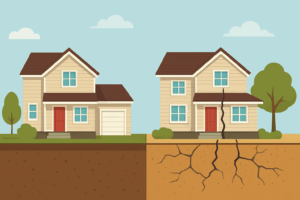
Homeowner’s associations (HOAs) play a crucial role in maintaining property values and community standards. In Texas, HOA liens can significantly impact real estate transactions. Here’s what you should know:
1. What is an HOA Lien?
An HOA lien is a legal claim placed on a homeowner’s property by the homeowner’s association (HOA) when dues remain unpaid. This lien gives the HOA the right to take action against the property if the homeowner does not fulfill their financial obligations.
Unlike other types of liens, such as mortgage or tax liens, an HOA lien specifically relates to fees owed for community services and maintenance provided by the association.
Key Components of an HOA Lien:
- Unpaid Dues: These are amounts that homeowners owe to their HOA. This can include regular assessments, special assessments for community projects, or fines for violations of community rules. An unpaid due initiates the process of establishing an HOA lien.
- Covenants, Conditions, and Restrictions (CC&Rs): Each HOA has its own set of CC&Rs that outline the responsibilities of homeowners, including payment obligations. It is crucial for homeowners to understand these documents as they dictate what constitutes a default in payments.
Understanding these nuances is essential. Homeowners should be aware that failing to meet their obligations can lead to significant consequences, including foreclosure on their property.
2. The Process of Enforcing an HOA Lien
When a homeowner falls behind on their dues, the homeowner’s association (HOA) has a process to enforce an HOA lien. Understanding this process is vital for any homeowner facing potential financial difficulties. Here’s a step-by-step guide on how an HOA enforces a lien for unpaid dues:
1. Issuing a Lien Notice
The enforcement process begins with the HOA issuing a lien notice to the homeowner. This document serves as formal notification of overdue payments and details the amount owed, including any late fees or penalties. Homeowners should take this notice seriously as it initiates the legal process.
2. Default & Intent to Accelerate Notice
Following the lien notice, the HOA may send a Default & Intent to Accelerate notice. This document informs the homeowner that if the overdue dues are not paid within a specified timeframe, the association will accelerate the payment—meaning the total amount due will be demanded immediately rather than in installments. This notice significantly speeds up the enforcement of the lien and puts homeowners on alert about their financial obligations.
3. Timeline for Response
Homeowners typically have a limited timeline to respond to the lien notice—often ranging from 30 to 45 days—depending on their association’s rules. Failure to address this notice can lead to serious consequences, including further legal action or foreclosure proceedings initiated by the HOA.
Initiating Foreclosure Proceedings
If dues remain unpaid and communication has failed, HOAs have the right to initiate foreclosure proceedings on properties with active liens due to unpaid dues.
Understanding Foreclosure
The foreclosure process allows an HOA to claim ownership of a property in order to recover unpaid dues. This can have lasting implications for homeowners, including loss of property and impact on credit scores.
Nonjudicial Foreclosure Methods
In Texas, HOAs commonly use nonjudicial foreclosure methods allowed under state law. This means they can foreclose without going through court, making it a faster and often less expensive option for associations. Nonjudicial foreclosures typically follow specific steps:
- The HOA must provide proper notification of the impending foreclosure.
- Homeowners are given another opportunity to settle their debts before any auction or sale occurs.
- If unresolved, properties are sold at public auction, often at a fraction of their market value.
Awareness of these steps helps homeowners understand what lies ahead if they face an HOA lien due to unpaid dues. Staying informed is crucial in navigating these situations effectively.
Other Articles You Might Enjoy:
- Messy Title Problems in Texas: What Every Homeowner Needs to Know
- Understanding HOA Liens in Texas: What You Need to Know
- Understanding Types of Liens: How They Impact Home Sellers
- Selling a House with Delinquent Taxes Or Property Tax Liens?
- Selling Your House with Property Taxes Owed: What You Need to Know
3. Rights and Responsibilities of Homeowners with HOA Liens

Homeowners facing an HOA lien must be aware of their property rights and financial responsibilities. Understanding these aspects can empower homeowners to effectively navigate potential disputes with their homeowner’s association.
Homeowners’ Rights
- Contesting the Lien: Homeowners have the right to contest the validity of an HOA lien. If you believe the lien is unjust or based on incorrect dues, gather your evidence. This could include payment records or correspondence with the HOA. Presenting your case can lead to a resolution without escalating the matter further.
- Access to Information: You have the right to request documentation regarding your dues and any communications related to the lien. Transparency from your HOA is vital.
Proactive Communication
Maintaining proactive communication with your homeowner’s association plays a crucial role in managing dues payments. Here are some tips:
- Notify Early: If you’re experiencing financial difficulties, reach out to your HOA as soon as possible. Explain your situation and seek advice on available options.
- Payment Plans: Many HOAs may offer flexible payment arrangements for homeowners in distress. Engaging in dialogue can help establish a manageable plan.
Understanding Redemption Rights After Foreclosure
In Texas, homeowners should be aware of their redemption rights after foreclosure due to unpaid HOA dues:
- Redemption Period: Texas law allows a homeowner a redemption period following foreclosure. This means you may have the opportunity to reclaim your property by paying off the owed amount, along with any associated fees.
- Legal Framework: Familiarity with this period is essential for making informed decisions during tough financial times.
Impact of Foreclosure on Property Sales
Foreclosure has significant effects on future property sales and marketability:
- Market Value Decline: A property that has been foreclosed upon often experiences a reduction in market value, affecting its appeal to potential buyers.
- Disclosure Obligations: When selling a home post-foreclosure, homeowners must disclose any outstanding liens or previous foreclosure actions. This transparency can impact negotiations and buyer interest.
Addressing outstanding liens proactively before attempting to sell is crucial. Homeowners should seek clarity on their obligations and work diligently towards resolving any issues related to unpaid dues.
Selling Your Property Before HOA Foreclosure
If you’re facing HOA foreclosure, selling your property early can be a good option. This lets you:
- Keep control of the sale
- Save your equity
- Get a better price than after foreclosure
Important steps:
- Work with your HOA to get the exact payoff amount
- Make sure the sale price covers:
- HOA dues
- Mortgage balance
Remember:
- Many buyers will purchase homes with HOA liens
- Liens can be paid off at closing
- You’ll likely get more money selling now vs. after foreclosure
- You can avoid credit damage
- You have more room to negotiate
Time matters – act quickly to get the best outcome.

TX Cash Home Buyers Gives Multiple Offer Options!
Unlock the potential of your home with our multiple offer options. Discover what you qualify for an make informed decisions with confidence.
4. Seeking Legal Assistance and Exploring Options as a Homeowner Facing an HOA Lien Foreclosure
Facing the potential of foreclosure due to an HOA lien can be overwhelming. Legal assistance can make a significant difference. Consulting with a real estate attorney who specializes in HOA-related matters provides clarity and guidance. Here’s why it’s essential:
- Expertise in Complexities: Real estate attorneys understand the nuances of HOA laws and can help you navigate your situation effectively. They can clarify your rights and options.
- Tailored Legal Steps: Every case is unique. An attorney will tailor legal steps for debt relief based on your specific circumstances, whether that involves negotiating payment plans or exploring bankruptcy options if necessary.
Legal Options Available for Homeowners
When dealing with an HOA lien foreclosure, homeowners have several legal avenues to explore:
- Negotiation: Engaging in direct communication with your homeowner’s association (HOA) may lead to negotiating a feasible payment plan.
- Debt Relief through Bankruptcy: If financial burdens are too great, seeking debt relief through bankruptcy might be a viable option. This process can potentially discharge certain debts, including unpaid dues.
Understanding these options empowers homeowners to take control of their financial situation.
Preventing Foreclosure by Your Homeowner’s Association: Strategies and Dispute Resolution Options
Taking proactive measures can prevent HOA liens from leading to foreclosure. Here are some strategies:
- Stay Current on Dues Payments: Maintaining timely payments helps avoid the accrual of unpaid dues that could result in a lien.
- Open Communication: If facing financial hardships, communicate promptly with the HOA. Transparency can facilitate understanding and may lead to leniency in payment deadlines or arrangements.
- Document Everything: Keep records of all communications with your HOA regarding dues payments and any agreements made. This documentation may prove valuable if disputes arise.
- Seek Mediation: If disagreements occur, consider mediation as a non-confrontational approach to resolving disputes with the association amicably.
Engaging with your homeowner’s association proactively can create a more favorable outcome and protect your property from potential foreclosure due to HOA liens.
5. Financial Solutions for Homeowners Struggling with Unpaid HOA Dues
Facing unpaid HOA dues can feel overwhelming. Exploring financial solutions can ease this stress. Here are some options to consider:
1. Personal Loans for Paying Off Overdue Dues
Personal loans provide a quick way to settle outstanding amounts. Interest rates vary, so shop around for the best deal. Evaluate the monthly payments and ensure they fit your budget. Remember, defaulting on the loan may lead to further financial trouble.
2. Home Equity Loans as a Potential Option for Settling Outstanding Balances Owed to the Association
If you have equity in your home, a home equity loan could be beneficial. This type of loan typically offers lower interest rates compared to personal loans. However, using your home as collateral means missed payments could risk your property.
Before taking on additional debt, consider these factors:
- Your current financial situation
- Long-term repayment ability
- Potential impact on credit score
Consult with a financial advisor to weigh the pros and cons of each option. Making informed decisions can help navigate through these financial challenges effectively.
Alternatively, if the burden of unpaid dues becomes too heavy, selling your house might be an option worth considering. Companies like TX Cash Home Buyers offer services where they buy houses in various locations of Texas without the need for an agent or any additional fees or repairs. This could provide a quick financial relief by settling your outstanding dues while also relieving you from the stress of managing unpaid HOA fees.
Final Thoughts: HOA Liens and Foreclosure
HOA liens in Texas can be tricky, but knowing your rights is key. While these liens help maintain community standards, they can create stress for homeowners. The good news is you have options if you’re facing HOA-related issues. Whether it’s setting up a payment plan, talking to a lawyer, or exploring financial solutions, there are ways to handle these challenges. The most important things to remember are:
- Stay informed about your rights
- Act quickly when issues come up
- Keep communication open with your HOA
- Get help when you need it
By taking these steps, you can better protect your home and maintain a good relationship with your HOA.
FAQs (Frequently Asked Questions)
What is an HOA lien and how does it differ from other types of liens?
An HOA lien is a statutory lien placed by a homeowner’s association on a property due to unpaid dues. Unlike other liens, such as mortgage or tax liens, HOA liens are specifically related to the obligations outlined in the association’s Covenants, Conditions, and Restrictions (CC&Rs). Understanding these differences is crucial for homeowners.
How does an HOA enforce a lien for unpaid dues?
The enforcement process begins with the issuance of a lien notice to the homeowner, notifying them of overdue payments. This is followed by a ‘Default & Intent to Accelerate’ notice, which accelerates the enforcement process. Homeowners have a specific timeline to respond to this notice before further actions, such as foreclosure proceedings, may be initiated.
What rights do homeowners have when facing an HOA lien?
Homeowners have the right to contest the validity of an HOA lien and should maintain proactive communication with their association regarding any financial difficulties. Additionally, Texas law provides homeowners with redemption rights after foreclosure, allowing them to reclaim their property under certain conditions.
What legal options are available for homeowners facing potential foreclosure due to an HOA lien?
Homeowners can consult with a real estate attorney who specializes in HOA matters. Legal options may include negotiating payment plans or seeking debt relief through bankruptcy. It’s important for homeowners to explore these avenues early to prevent foreclosure.
What financial solutions are available for homeowners struggling with unpaid HOA dues?
Homeowners can consider personal loans or home equity loans as potential solutions for settling outstanding balances owed to their homeowner’s association. However, they should carefully evaluate their financial situation before taking on additional debt.
How can homeowners prevent their association from initiating foreclosure proceedings?
Homeowners can prevent foreclosure by staying current on dues payments and promptly communicating any financial hardships with their homeowner’s association. Proactive measures and open dialogue are key strategies in resolving issues before they escalate.
Disclaimer:
The content provided on this blog is for informational purposes only. We are not attorneys or tax professionals. For personalized legal or tax advice, please consult with a qualified professional.
Written by Lisa Martinez, Founder of TX Cash Home Buyers

About The Company
TX Cash Home Buyers helps Texas homeowners sell quickly and simply — even in tough situations like repairs, inherited homes, or financial stress. Founded by Lisa Martinez, we’re known for our local experience, fair offers, and commitment to guiding sellers through off-market sales with clarity and care.




